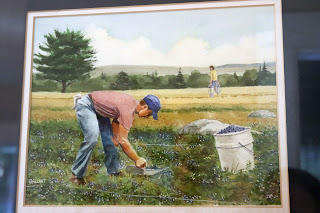When Feeling Blue Was Normal
I grew up on a Maine poultry farm, so daily chores came before my first paying job. Those included pulling weeds from our gardens and cleaning and grading eggs in our old rock-walled cellar. My first paying job, one that most other kids, unless they came from a wealthy (by 1950s standards) family had, was raking wild blueberries.
It wasn’t a job for the faint of heart, or anyone whose pain threshold was low. We used metal box rakes with a row pf long pointed tines. These were moved under the thick clumps of berries lifted, and then the hanging weeds were pulled free as the rake was tipped up so the berries stayed in the box part. This was repeated over and over while you were bent over, other arm braced on your knee. Berries were dumped into a woven bushel basket. When that was full, you carried it to where the crew boss ran a gasoline powered contraption called a winnowing machine that used a big fan to blow leaves and twigs out of the raked berries.
Then you staggered back to where you’d been raking and started again. Encounters with field spiders, ground wasps, and deer flies were daily happenings. Blisters and extremely sore backs were part of the first few days of work, as was sunburn. You learned to take bathroom breaks behind big trees in the woods beside the fields, drink lots of water, and occupy your mental processes by listening to what others said or sang.
I started raking when I was eleven and after a few summers, graduated to working in the processing plant where workers sat along belts that moved the berries after they had a water bath and more air cleaning of debris. I helped unload boxes from the fields, load clean boxes of berries on the truck that took them to the blast freezer plant in Portland. I developed a crush, never followed up on one of Frank Hart’s two granddaughters who worked on the line. When things were slow, I was tasked with taking care of laying hens in an adjacent building, thanks to my having grown up on a chicken farm.
I have very distinct memories of those times, getting rejected by a girl on one of the raking crews who was in my high school class. She chose another crew member and I believe they are still married all these years later. Also watching a black bear follow our truck full of rakers out of a blueberry field, only to turn tail and run into the woods after the whole load of enthusiastic, but not terribly smart kids jumped out of the truck and chased it.
I was trusted by adults, something often lacking at home. I remember being asked to drive a dual-speed axle dump truck from the plant in Appleton up to Cherryfield where a big blueberry plant was, relishing the frequent shifting of both the axle and the numerous gears. I often rode with an older guy named Glen on runs to that freezer plant in Portland after the plant shut down for the night. We rode in a companionable silence, smoking cigarettes, then watching as a crew of white suited workers busily unloaded the boxes, dumping them into a hopper, soon to be frozen and then destined to become integral ingredients in pies, muffins and other tasty treats.
I still have my rake and occasionally use it. My sister Kate was gifted the deed to a twenty acre blueberry field adjacent to where we grew up. It was a birthday present from her husband. It is now operated as an organic field. Today’s rakers are more likely to be Latino immigrants and Native Americans since kids today are softer and can’t seem to pull themselves away from social media or jobs in air conditioned stores.
As you can tell, my memories of that job and time remain vivid and are something I have drawn upon for my first two books, as well as for short stories and essays published in Wolf Moon Journal. They also were what taught me to pay attention to the natural world around me, as well as to observe people from the perspective of a storyteller.


This is so visual! I hope you work this into a book.
ReplyDelete